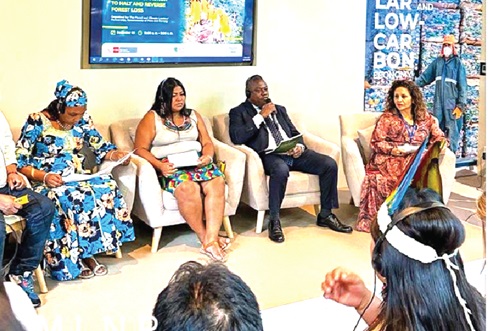
Ghana operates transparent reforestation, afforestation initiatives — Forestry Commission
The Chief Executive of the Forestry Commission, John Allotey, has stated that the government, through the Commission, has been very open, engaging and accountable with its forest degradation reversal initiatives.
He said the nation’s reforestation and afforestation policy was anchored on community engagement, accountability and transparency.
Representing the Lands and Natural Resources Minister, Samuel Abu Jinapor, at a high-level discussion at the COP 28, he stressed that at the heart of the interventions were community engagement and involvement of community stakeholders in the planning, execution and monitoring of policies.
The forum was on the topic: “Indigenous Peoples and Local Communities as Leaders of Action to Halt and Reverse Forest Loss,’ hosted by the Peruvian Government at the world gathering to discuss climate change.
Mr Allotey outlined a number of policy interventions which had indigenous people at the core of it and highlighted the transparent nature of the policies.
He said, for instance, the Community Resource Management Area (CREMA) intervention had been successful because of the transparent manner it had been handled, stressing that:
“In Ghana, we have made a lot of strides in bringing the indigenous people to the table through the measures we have put in place.
“We have mobilised the people to form a group made up of the community leaders and people around the areas.
They are involved in designing programmes, execution and monitoring.
They are also involved in the interventions we execute,” he explained.
Adopt blueprint
Mr Allotey emphasised the importance of involving residents right from the embryonic stage of the process as such an approach would empower the locals to be interested in and come up with innovative ideas that would guarantee the success and sustainability of the policies.
The Forestry Commission boss further stated that it was important to create ownership for the residents of communities by involving them right from the beginning.
He thus encouraged other countries to follow Ghana’s blueprint and ensure the active involvement of residents in their forest preservation plans.
“The community people are directly impacted by the forest.
They derive their food, water, basically their livelihood from the forest.
Any discussion that bothers on forest conservation cannot happen without their involvement.
We need to create a situation where they will be part of the process right from the beginning.
“If you are able to do that then, they will be part of the discussion.
In most cases, you have the decision taken from the top level and imposed on them.
If you do that, they will not own the process,” he added.
In selecting leaders to represent the indigenous people, Mr Allotey stated that gender manifestation, transparency and the youth should be considered.
He also touched on leadership accountability and governance structure, explaining that they were keys not just for a successful implementation, but also earned the trust of the communities.
